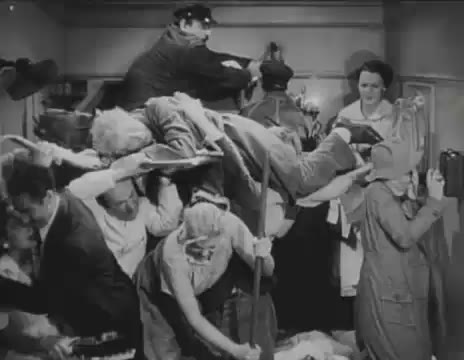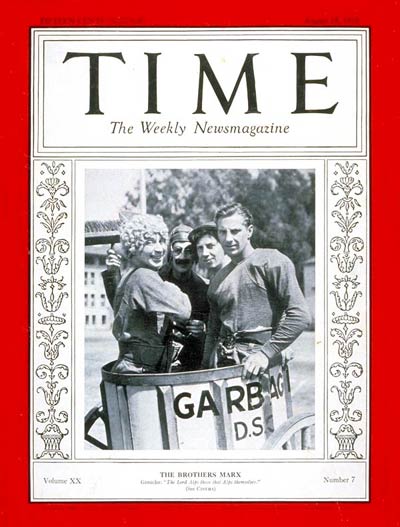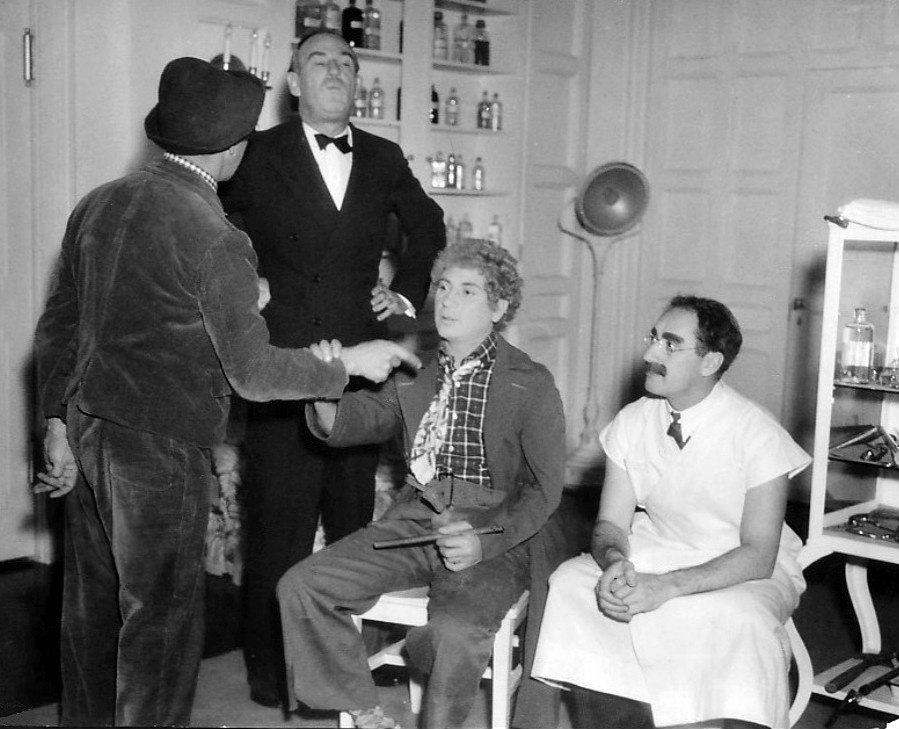|
Margaret Dumont
Margaret Dumont (born Daisy Juliette Baker; October 20, 1882 – March 6, 1965) was an American stage and film actress. She is best remembered as the comic foil to the Marx Brothers in seven of their films; Groucho Marx called her "practically the fifth Marx brother." Early life Dumont was born Daisy Juliette Baker in Brooklyn, New York, the daughter of William and Harriet Anna (née Harvey) Baker. Her mother was a music teacher and encouraged Daisy's singing career from an early age. Career Dumont trained as an operatic singer and actress in her teens and began performing on stage in the US and Europe, at first under the name Daisy Dumont and later as Margaret (or Marguerite - French for Daisy) Dumont. Her theatrical debut was in ''Sleeping Beauty and the Beast'' at the Chestnut Theater in Philadelphia; in August 1902, two months before her 20th birthday, she appeared as a singer/comedian in a vaudeville act in Atlantic City. The dark-haired soubrette, described by a theater ... [...More Info...] [...Related Items...] OR: [Wikipedia] [Google] [Baidu] |
A Night At The Opera (film)
''A Night at the Opera'' is a 1935 American comedy film starring the Marx Brothers (Groucho Marx, Harpo Marx and Chico Marx), and featuring Kitty Carlisle, Allan Jones, Margaret Dumont, Sig Ruman, and Walter Woolf King. It was the first of five films the Marx Brothers made under contract for Metro-Goldwyn-Mayer after their departure from Paramount Pictures, and the first after Zeppo left the act. The film was written by George S. Kaufman and Morrie Ryskind from a story by James Kevin McGuinness, with additional uncredited dialogue by Al Boasberg. The film was directed by Sam Wood. One of MGM's biggest hits at the 1935 box office, ''A Night at the Opera'' was selected in 1993 for preservation in the National Film Registry by the Library of Congress as being "culturally, historically, or aesthetically significant". [...More Info...] [...Related Items...] OR: [Wikipedia] [Google] [Baidu] |
Animal Crackers (musical)
''Animal Crackers'' is a musical play with music and lyrics by Bert Kalmar and Harry Ruby and a book by George S. Kaufman and Morrie Ryskind. The musical starred the Marx Brothers. Original production ''Animal Crackers'' opened on Broadway on October 23, 1928, at the 44th Street Theatre, and closed April 6, 1929, running for 191 performances. The musical was produced by Sam H. Harris, staged by Oscar Eagle, and starred the four Marx Brothers and Margaret Dumont in the Brothers' second Broadway hit. Hermes Pan appeared as a chorus boy. The play was filmed in 1930 with most of the principal leads repeating their roles from the stage production, and most of the musical numbers cut. After ''The Cocoanuts'' ran for almost three years at the Lyric Theatre, the "anarchic" ''Animal Crackers'' became the third and last Broadway show for the Marx Brothers (''I'll Say She Is'' was the first). It would be their last stage show, after which they focused on film. Vaudeville's heyday was ... [...More Info...] [...Related Items...] OR: [Wikipedia] [Google] [Baidu] |
Zeppo Marx
Herbert Manfred "Zeppo" Marx (February 25, 1901 – November 30, 1979) was an American comedic actor, theatrical agent, and engineer. He was the youngest and last survivor of the five Marx Brothers. He appeared in the first five Marx Brothers feature films, from 1929 to 1933, but then left the act to start his second career as an engineer and theatrical agent. Early life Zeppo was born in Manhattan, New York City, on February 25, 1901. His parents were Sam Marx (called "Frenchie" throughout his life), and his wife, Minnie Schönberg Marx. Minnie's brother was Al Shean, who later gained fame as half of the vaudeville team Gallagher and Shean. Marx's family was Jewish. His mother was from East Frisia in Germany and his father was a native of Alsace, France, and worked as a tailor. Name As with all of the Marx Brothers, different theories exist as to where Zeppo got his stage name: His older brother Groucho said in his Carnegie Hall concert in 1972 that the name was derived fro ... [...More Info...] [...Related Items...] OR: [Wikipedia] [Google] [Baidu] |
Erin Fleming
Erin Leslie Fleming (August 13, 1941 – April 15, 2003) was a Canadian actress best known as the companion, secretary and manager of comedian Groucho Marx during his final years. Early career Fleming was born Marilyn Suzette Fleming on August 13, 1941, in New Liskeard, Ontario, Canada. She appeared in minor roles on television and in six feature films between 1965 and 1976, during which time she became acquainted with Groucho Marx and was initially hired as his secretary. Her most prominent film role was in the 1972 Woody Allen movie '' Everything You Always Wanted to Know About Sex* (*But Were Afraid to Ask)''. Relationship with Groucho Marx Fleming's influence and relationship with Groucho Marx were controversial. Groucho and Fleming met in 1971 and she was initially (and extemporaneously) hired as his secretary. Eventually, she assumed the role of his manager. Many of Groucho's friends and colleagues acknowledged that she did much to revive his popularity, by arrang ... [...More Info...] [...Related Items...] OR: [Wikipedia] [Google] [Baidu] |
Chico Marx
Leonard Joseph "Chico" Marx (; March 22, 1887 – October 11, 1961) was an American comedian, actor and pianist. He was the oldest brother in the Marx Brothers comedy troupe, alongside his brothers Adolph ("Harpo"), Julius ("Groucho"), Milton ("Gummo") and Herbert ("Zeppo"). His persona in the act was that of a charming, uneducated but crafty con artist, seemingly of rural Italian origin, who wore shabby clothes and sported a curly-haired wig and Tyrolean hat. On screen, Chico is often in alliance with Harpo, usually as partners in crime, and is also frequently seen trying to con or outfox Groucho. Leonard was the oldest of the Marx Brothers to live past early childhood (first-born was his older brother Manfred Marx who had died in infancy). In addition to his work as a performer, he played an important role in the management and development of the act in its early years. Early years Chico (pronounced as Chicko) was born in Manhattan, New York City, on March 22, 1887.During hi ... [...More Info...] [...Related Items...] OR: [Wikipedia] [Google] [Baidu] |
Harpo Marx
Arthur "Harpo" Marx (born Adolph Marx; November 23, 1888 – September 28, 1964) was an American comedian, actor, mime artist, and harpist, and the second-oldest of the Marx Brothers. In contrast to the mainly verbal comedy of his brothers Groucho and Chico, Harpo's comic style was visual, being an example of vaudeville, clown and pantomime traditions. He wore a curly reddish blond wig and was silent in all his movie appearances, instead blowing a horn or whistling to communicate. Marx frequently employed props such as a horn cane constructed from a lead pipe, tape, and a bulbhorn. Early life Harpo was born on November 23, 1888, in Manhattan, New York City. He grew up in a neighborhood now known as Carnegie Hill (known at the time as Yorkville) on the Upper East Side of Manhattan, on East 93rd Street off Lexington Avenue. The turn-of-the-century tenement that Harpo later called "the first real home I can remember" was situated in a neighborhood populated with European immig ... [...More Info...] [...Related Items...] OR: [Wikipedia] [Google] [Baidu] |
Carnegie Hall
Carnegie Hall ( ) is a concert venue in Midtown Manhattan in New York City. It is at 881 Seventh Avenue (Manhattan), Seventh Avenue, occupying the east side of Seventh Avenue between West 56th Street (Manhattan), 56th and 57th Street (Manhattan), 57th Streets. Designed by architect William Burnet Tuthill and built by philanthropist Andrew Carnegie, it is one of the most prestigious venues in the world for both classical music and popular music. Carnegie Hall has its own artistic programming, development, and marketing departments and presents about 250 performances each season. It is also rented out to performing groups. Carnegie Hall has 3,671 seats, divided among three auditoriums. The largest one is the Stern Auditorium, a five-story auditorium with 2,804 seats. Also part of the complex are the 599-seat Zankel Hall on Seventh Avenue, as well as the 268-seat Joan and Sanford I. Weill Recital Hall on 57th Street. Besides the auditoriums, Carnegie Hall contains offices on its t ... [...More Info...] [...Related Items...] OR: [Wikipedia] [Google] [Baidu] |
Cecilia Ager
Cecelia Ager ( Rubinstein; January 23, 1902 – April 3, 1981) was an American film critic and star reporter for ''Variety'' and the ''New York Times Magazine''. Life and career Ager was born Cecelia Rubenstein in Grass Valley, California, a mining town, the daughter of Fannie (Meyer) and Zalkin H. Rubenstein. Her parents were Polish Jewish immigrants. She married Milton Ager four months after meeting him; Mayor Jimmy Walker of New York, also a songwriter, presided at the wedding in his office. Ager was the first female reporter for ''Variety'', and was known as one of the best dressed women in America. Ager was the movie critic for the New York newspaper '' PM'' and a contributor to ''The New York Times'' and several national magazines. Her sense of style became an asset to advance her work as a writer. It has been said that "she used fashion as her entry into examining the constricting roles women were asked to play, in real life and onscreen.” Her astute and often witti ... [...More Info...] [...Related Items...] OR: [Wikipedia] [Google] [Baidu] |
Screen Actors Guild
The Screen Actors Guild (SAG) was an American labor union which represented over 100,000 film and television principal and background performers worldwide. On March 30, 2012, the union leadership announced that the SAG membership voted to merge with the American Federation of Television and Radio Artists (AFTRA) to create SAG-AFTRA. According to SAG's Mission Statement, the Guild sought to: negotiate and enforce collective bargaining agreements that establish equitable levels of compensation, benefits, and working conditions for its performers; collect compensation for exploitation of recorded performances by its members, and provide protection against unauthorized use of those performances; and preserve and expand work opportunities for its members. The Guild was founded in 1933 in an effort to eliminate what was described as exploitation of Hollywood actors who were being forced into oppressive multi-year contracts with the major movie studios. Opposition to these cont ... [...More Info...] [...Related Items...] OR: [Wikipedia] [Google] [Baidu] |
The Big Store
''The Big Store'' is a 1941 American comedy film starring the Marx Brothers (Groucho Marx, Harpo Marx and Chico Marx) that takes place in a large department store. Groucho appears as private detective Wolf J. Flywheel (a character name originating from the Marx-Perrin radio show ''Flywheel, Shyster, and Flywheel'' in the early 1930s). ''The Big Store'' was the last of the five films that the Marx Bros. made under contract to Metro-Goldwyn-Mayer. The Marxes had decided to retire as a team and ''The Big Store'' was advertised as their farewell film. However, they would return to the screen in ''A Night in Casablanca'' (1946) and ''Love Happy'' (1949). The film also features singer Tony Martin (American singer), Tony Martin and Virginia Grey as the love interests and longtime Marx Brothers foil Margaret Dumont in her seventh and final film with the Marxes. The villain is portrayed by Douglass Dumbrille, who had played a similar role in ''A Day at the Races (film), A Day at the Races ... [...More Info...] [...Related Items...] OR: [Wikipedia] [Google] [Baidu] |
At The Circus
''At the Circus'' is a 1939 comedy film starring the Marx Brothers (Groucho Marx, Harpo Marx and Chico Marx) released by Metro-Goldwyn-Mayer in which they help save a circus from bankruptcy. The film contains Groucho Marx's classic rendition of "Lydia the Tattooed Lady". The supporting cast includes Florence Rice, Kenny Baker, Margaret Dumont, and Eve Arden. The songs, including "Lydia the Tattooed Lady", "Two Blind Loves", and "Step Up and Take a Bow", were written by the team of Harold Arlen and Yip Harburg. The villain is portrayed by Nat Pendleton, who had played a similar role in Horse Feathers (1932), when The Marx Brothers were still under contract to Paramount. Plot Goliath, the circus strongman and the midget, Little Professor Atom, both employed by Wilson's Wonder Circus, are accomplices of bad guy John Carter who is trying to take over the circus, owned by Jeff Wilson. Julie Randall, Jeff's girlfriend, performs a horse act in the circus. Jeff has hidden $10,000 in c ... [...More Info...] [...Related Items...] OR: [Wikipedia] [Google] [Baidu] |
A Day At The Races (film)
''A Day at the Races'' is a 1937 American comedy film, and the seventh film starring the Marx Brothers (Groucho Marx, Harpo Marx and Chico Marx), with Allan Jones, Maureen O'Sullivan and Margaret Dumont. Like their previous Metro-Goldwyn-Mayer feature '' A Night at the Opera'', this film was a major hit. Plot The Standish Sanitarium, owned by Judy Standish, has fallen on hard times. Banker J.D. Morgan, who owns a nearby race track, hotel and nightclub, holds the mortgage on the sanitarium and is attempting to purchase it in order to convert the building into a casino. Judy's faithful employee Tony, suggests asking financial help from the wealthy patient Mrs. Emily Upjohn, who is a hypochondriac. After being pronounced healthy by the sanitarium's doctors, Mrs. Upjohn threatens to leave the Sanitarium for treatment by Dr. Hugo Z. Hackenbush. Tony overhears her praise of Hackenbush, who is, unknown to her, a horse doctor. When Tony lies to Mrs. Upjohn, telling her that Hackenbush ha ... [...More Info...] [...Related Items...] OR: [Wikipedia] [Google] [Baidu] |






